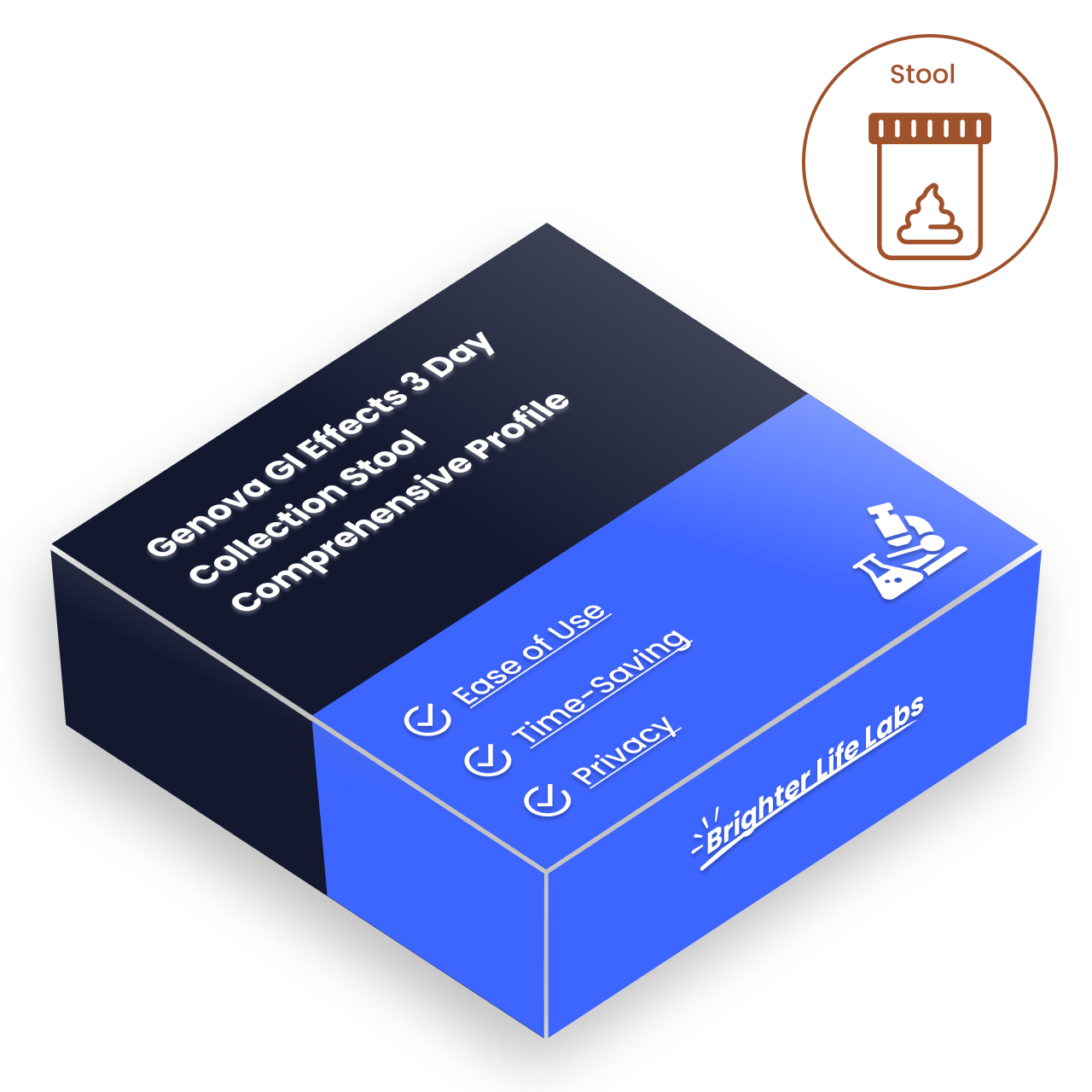Genova
Genova Gut Health GI Effects 3 Day Collection Stool Comprehensive Profile w/ Parasitology
Genova Gut Health GI Effects 3 Day Collection Stool Comprehensive Profile w/ Parasitology
Couldn't load pickup availability
The GI Effects Stool Profiles can reveal important information about the root cause of many common gastrointestinal symptoms and non-GI conditions including:
- Gas
- Bloating
- Indigestion/ reflux
- Abdominal pain/ cramps
- Diarrhea
- Constipation
- Inflammatory Bowel Disease (IBD) [1,2]
- Irritable Bowel Syndrome (IBS) [3,4]
- Atopic dermatitis/ eczema [5,6]
- Allergies [5]
- Autoimmune diseases [7,8]
- Mood disorders (depression) [9,10]
- Joint aches [11,12]
- Diabetes [13,14,15]
- Weight issues [15,16,17,18]
The health of the entire body is dependent on a healthy gut and gut microbiome. Gut microbes are codependent with one another and with their human host, and the health of one affects the other. A sizeable volume of research associates a dysbiotic, or imbalanced gut microbiome with multiple disease states both within and outside of the GI tract. [19,20,21] The diverse metabolic activities of the microbiome ultimately impact the human host, and the activities of the human host ultimately affect the health of their microbiome.
Note: This is a home collection test kit that will be mailed to you. NOT to be used for children under the age of 2. This is a three day collection kit.
Description:
The GI Effects® Comprehensive Stool Profile is an advanced stool test that provides immediate, actionable clinical information for the management of gastrointestinal health. Utilizing cutting-edge technologies and biomarkers, this test offers valuable insight into digestive function, intestinal inflammation, and the intestinal microbiome. The biomarkers from the GI Effects Comprehensive Profile are reported using the DIG framework, providing key clinical information for three main gastrointestinal functional areas:
Digestion/Absorption:
Pancreatic Elastase-1
is a marker of exocrine pancreatic function.
Products of Protein Breakdown
are markers of undigested protein reaching the colon.
Fecal Fat
is a marker of fat breakdown and absorption.
Inflammation/Immunology:
Calprotectin
is a marker of neutrophil-driven inflammation. Produced in abundance at sites of inflammation, this biomarker has been proven clinically useful in differentiating between Inflammatory Bowel Disease (IBD) and Irritable Bowel Syndrome (IBS).
Eosinophil Protein X
is a marker of eosinophil-driven inflammation and allergic response.
Fecal Secretory IgA
is a marker of gut secretory immunity and barrier function.
Fecal Occult Blood Test
detects hidden blood; fecal immunochemical testing (FIT) has been recommended by the American College of Gastroenterology as the preferred noninvasive test for colorectal cancer screening/detection.
Gut Microbiome:
Metabolic indicators
, including short-chain fatty acids and beta-glucuronidase, demonstrate specific and vital metabolic functions performed by the microbiota.
Commensal Bacteria
demonstrate the composition and relative abundance of gut organisms. More than 95% of commensal gut organisms are anaerobic and are difficult to recover by traditional (aerobic) culture techniques. GI Effects assesses a set of 24 genera/species that map to 7 major phyla.
Bacterial and mycology cultures
demonstrate the presence of specific beneficial and pathological organisms.
Bacteria and mycology sensitivities
are provided for pathogenic or potentially pathogenic organisms that have been cultured. The report includes effective prescriptive and natural agents.
Parasitology
GI Effects provides microscopic fecal specimen examination for ova and parasites (O&P), the gold standard of diagnosis for many parasites. 6 Polymerase chain reaction (PCR) targets detect common protozoan parasites including Blastocystis spp., Cryptosporidium spp., Cyclospora cayetanensis, Dientamoeba fragilis, Entamoeba histolytica, and Giardia. PCR for organisms is emerging as a highly sensitive method for infectious organism detection. Selection of a one-day or three-day sample collection is based on clinician's clinical index of suspicion for parasitic infection. If there is no/low suspicion, a one-day sample will likely be adequate. For high suspicion, a three-day sample collection is optimal.
Analytes Reported:
Acetate % Akkermansia muciniphila Anaerotruncus colihominis Bacteriology Bacteroides vulgatus Bacteroides-Prevotella group Barnesiella spp. Beta- glucuronidase Bifidobacterium longum Bifidobacterium spp. Butyrivibrio crossotus Calprotectin Cholesterol Clostridium spp. Collinsella aerofaciens Color Consistency Coprococcus eutactus Desulfovibrio piger Eosinophil Protein X (EPX) Escherichia coli Faecalibacterium prausnitzii Fecal Fat (Total) Fecal Occult Blood Firmicutes/Bacteroidetes (F/B Ratio) Fusobacterium spp. Lactobacillus spp. Long Chain Fatty Acids Methanobrevibacter smithii Mic Sensitivities, Yeast or Bacteria Microscopic Exam Results Mycology (Yeast/Fungi) Odoribacter spp. Other Biomarkers Oxalobacter formigenes Pancreatic Elastase 1 Parasitology Phospholipids Prevotella spp. Products of Protein Breakdown (Total) (Valerate+Isobutyrate+
Additional Biomarkers Available for add-on at additional cost, Email for Pricing:
Campylobacter EIA Clostridium difficile EIA Enterohemorrhagic E. Coli Shiga-like toxin Helicobacter pylori EIA Fecal Lactoferrin Direct Examination for Parasites KOH Preparation for Yeast Zonulin Family Peptide, Stool
Share


